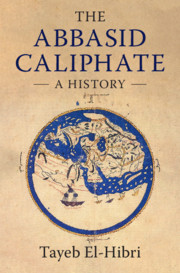Book contents
- The Abbasid Caliphate
- The Abbasid Caliphate
- Copyright page
- Dedication
- Contents
- Figures
- Maps
- Acknowledgments
- Note on Transliteration
- Chronology
- Abbreviations
- Genealogical Chart of the Caliphs
- Maps
- 1 Introduction
- 2 From Revolution to Foundations (750–775)
- 3 The Golden Age of the Abbasid Caliphate (775–833)
- 4 From Triumph to Tribulation (833–990)
- 5 The Caliphate as a Religious Authority (990–1225)
- 6 The Twilight of the Abbasid Caliphate (1225–1258)
- 7 Conclusion
- Appendix: The Abbasid Caliphs
- Glossary
- Bibliography
- Index
- Plate Section
3 - The Golden Age of the Abbasid Caliphate (775–833)
Published online by Cambridge University Press: 28 April 2021
- The Abbasid Caliphate
- The Abbasid Caliphate
- Copyright page
- Dedication
- Contents
- Figures
- Maps
- Acknowledgments
- Note on Transliteration
- Chronology
- Abbreviations
- Genealogical Chart of the Caliphs
- Maps
- 1 Introduction
- 2 From Revolution to Foundations (750–775)
- 3 The Golden Age of the Abbasid Caliphate (775–833)
- 4 From Triumph to Tribulation (833–990)
- 5 The Caliphate as a Religious Authority (990–1225)
- 6 The Twilight of the Abbasid Caliphate (1225–1258)
- 7 Conclusion
- Appendix: The Abbasid Caliphs
- Glossary
- Bibliography
- Index
- Plate Section
Summary
The reign of the caliph Harun al-Rashid is entwined with history and legend. This chapter disentangles the influences of the Arabian Nights and Orientalism on this caliph's biography, and explores his pursuit of a centralizing policy that culminated with the overthrow of the Barmakid ministers and the establishment of his base in Raqqa. The caliphate of al-Rashid evokes a wide range of themes dealing with international trade, Byzantine war, foreign embassies to Charlemagne, and a contentious plan for caliphal succession between his sons, al-Amin and al-Ma'mun.In spite of a civil war, the caliphate recovers under al-Ma'mun and goes on to experience an age of scientific englightenment sparked by the famous Greek to Arabic translation movement centered on classical texts. Al-Ma'mun's interest in philosophy, and his support for the rationalizing sect of the Mu'tazila, however, culminates with a backlash from traditionalist scholars and a standoff in the episode known as the Mihna.
Keywords
- Type
- Chapter
- Information
- The Abbasid CaliphateA History, pp. 69 - 130Publisher: Cambridge University PressPrint publication year: 2021

